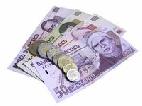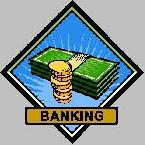
 |
|
| Financial Terms | |
| Euroclear |
|
Information about financial, finance, business, accounting, payroll, inventory, investment, money, inventory control, stock trading, financial advisor, tax advisor, credit.
Main Page: payroll, tax advisor, accounting, finance, investment, inventory, financial advisor, stock trading, |
Definition of Euroclear
EuroclearOne of two principal clearing systems in the Eurobond market. It began operations in 1968, is
Related Terms:DLOM (discount for lack of marketability)an amount or percentage deducted from an equity interest to reflect lack of marketability. economic components modelAbrams’ model for calculating DLOM based on the interaction of discounts from four economic compOnents. QMDM (quantitative marketability discount model)model for calculating DLOM for minority interests r the discount rate Agency bankA form of organization commonly used by foreign Banks to enter the U.S. market. An agency All or noneRequirement that nOne of an order be executed unless all of it can be executed at the specified price. All-or-none underwritingAn arrangement whereby a security issue is canceled if the underwriter is unable At-the-moneyAn option is at-the-mOney if the strike price of the option is equal to the market price of the  Auction marketsmarkets in which the prevailing price is determined through the free interaction of Automated Clearing House (ACH)A collection of 32 regional electronic interBank networks used to BAN (Bank anticipation notes)Notes issued by states and municipalities to obtain interim financing for Bank collection floatThe time that elapses between when a check is deposited into a Bank account and when the funds are available to the depositor, during which period the Bank is collecting payment from the payer's Bank. Bank discount basisA convention used for quoting bids and offers for treasury bills in terms of annualized Bank draftA draft addressed to a Bank. Bank lineLine of credit granted by a Bank to a customer. Bank wireA computer message system linking major Banks. It is used not for effecting payments, but as a Banker's acceptanceA short-term credit investment created by a non-financial firm and guaranteed by a  Bank for International Settlements (BIS)An international Bank headquartered in Basel, Switzerland, which BankruptcyState of being unable to pay debts. Thus, the ownership of the firm's assets is transferred from Bankruptcy cost viewThe argument that expected indirect and direct Bankruptcy costs offset the other Bankruptcy riskThe risk that a firm will be unable to meet its debt obligations. Also referred to as default or insolvency risk. Bankruptcy viewThe argument that expected Bankruptcy costs preclude firms from being financed entirely Bear marketAny market in which prices are in a declining trend. Black marketAn illegal market. Brokered marketA market where an intermediary offers search services to buyers and sellers. Bull marketAny market in which prices are in an upward trend. Bulldog marketThe foreign market in the United Kingdom. Call money rateAlso called the broker loan rate , the interest rate that Banks charge brokers to finance Capital marketThe market for trading long-term debt instruments (those that mature in more than One year). Capital market efficiencyReflects the relative amount of wealth wasted in making transactions. An efficient Capital market imperfections viewThe view that issuing debt is generally valuable but that the firm's Capital market line (CML)The line defined by every combination of the risk-free asset and the market portfolio. Cash flow from operationsA firm's net cash inflow resulting directly from its regular operations Cash marketsAlso called spot markets, these are markets that involve the immediate delivery of a security Clearing House Automated Payments System (CHAPS)A computerized clearing system for sterling funds Clearing House Interbank Payments System (CHIPS)An international wire transfer system for high-value Clearing memberA member firm of a clearing house. Each clearing member must also be a member of the Clearing house / ClearinghouseAn adjunct to a futures exchange through which transactions executed its floor are settled by a Common marketAn agreement between two or more countries that permits the free movement of capital Common stock marketThe market for trading equities, not including preferred stock. Complete capital marketA market in which there is a distinct marketable security for each and every Consortium banksA merchant Banking subsidiary set up by several Banks that may or may not be of the Convertible eurobondA Eurobond that can be converted into another asset, often through exercise of Corner A MarketTo purchase enough of the available supply of a commodity or stock in order to Dealer marketA market where traders specializing in particular commodities buy and sell assets for their Debt marketThe market for trading debt instruments. Derivative marketsmarkets for derivative instruments. Direct search marketBuyers and sellers seek each other directly and transact directly. Domestic marketPart of a nation's internal market representing the mechanisms for issuing and trading Dow Jones industrial averageThis is the best known U.S.index of stocks. It contains 30 stocks that trade on Efficient capital marketA market in which new information is very quickly reflected accurately in share Efficient Market HypothesisIn general the hypothesis states that all relevant information is fully and Either-way marketIn the interBank Eurodollar deposit market, an either-way market is One in which the bid Eligible bankers' acceptancesIn the BA market, an acceptance may be referred to as eligible because it is Emerging marketsThe financial markets of developing economies. Equilibrium market price of riskThe slope of the capital market line (CML). Since the CML represents the Equity marketRelated:Stock market EurobankA Bank that regularly accepts foreign currency denominated deposits and makes foreign currency loans. EurobondA bond that is (1) underwritten by an international syndicate, (2) offered at issuance Eurocurrency marketThe mOney market for borrowing and lending currencies that are held in the form of European Monetary System (EMS)An exchange arrangement formed in 1979 that involves the currencies Excess return on the market portfolioThe difference between the return on the market portfolio and the Export-Import Bank (Ex-Im Bank)The U.S. federal government agency that extends trade credits to U.S. External marketAlso referred to as the international market, the offshore market, or, more popularly, the Fair market priceAmount at which an asset would change hands between two parties, both having Federal Financing BankA federal institution that lends to a wide array of federal credit agencies funds it Federal funds marketThe market where Banks can borrow or lend reserves, allowing Banks temporarily Federal Home Loan BanksThe institutions that regulate and lend to savings and loan associations. The Financial marketAn organized institutional structure or mechanism for creating and exchanging financial assets. Fixed-income marketThe market for trading bonds and preferred stock. Foreign banking marketThat portion of domestic Bank loans supplied to foreigners for use abroad. Foreign bond marketThat portion of the domestic bond market that represents issues floated by foreign Foreign equity marketThat portion of the domestic equity market that represents issues floated by foreign companies. Foreign marketPart of a nation's internal market, representing the mechanisms for issuing and trading Foreign market betaA measure of foreign market risk that is derived from the capital asset pricing model. Forward marketA market in which participants agree to trade some commodity, security, or foreign Fourth marketDirect trading in exchange-listed securities between investors without the use of a broker. Funds From Operations (FFO)Used by real estate and other investment trusts to define the cash flow from Futures marketA market in which contracts for future delivery of a commodity or a security are bought or sold. Generally Accepted Accounting Principals (GAAP)A technical accounting term that encompasses the Gray marketPurchases and sales of Eurobonds that occur before the issue price is finally set. Hot moneyMOney that moves across country borders in response to interest rate differences and that moves Income statement (statement of operations)A statement showing the revenues, expenses, and income (the Index and Option Market (IOM)A division of the CME established in 1982 for trading stock index Intermarket sectorspread The spread between the interest rate offered in two sectors of the bond market for Intermarket spread swapsAn exchange of One bond for another based on the manager's projection of a Internal marketThe mechanisms for issuing and trading securities within a nation, including its domestic Internally efficient marketOperationally efficient market. International Bank for Reconstruction and Development - IBRD or World BankInternational Bank for Reconstruction and Development makes loans at nearly conventional terms to countries for projects of high International Banking Facility (IBF)International Banking Facility. A branch that an American Bank International marketRelated: See external market. International Monetary FundAn organization founded in 1944 to oversee exchange arrangements of International Monetary Market (IMM)A division of the CME established in 1972 for trading financial In-the-moneyA put option that has a strike price higher than the underlying futures price, or a call option Intramarket sector spreadThe spread between two issues of the same maturity within a market sector. For Inverted marketA futures market in which the nearer months are selling at price premiums to the more Investment bankFinancial intermediaries who perform a variety of services, including aiding in the sale of Joint clearing membersFirms that clear on more than One exchange. Just-in-time inventory systemssystems that schedule materials/inventory to arrive exactly as they are Law of one priceAn economic rule stating that a given security must have the same price regardless of the Legal bankruptcyA legal proceeding for liquidating or reorganizing a business. Related to : financial, finance, business, accounting, payroll, inventory, investment, money, inventory control, stock trading, financial advisor, tax advisor, credit. |